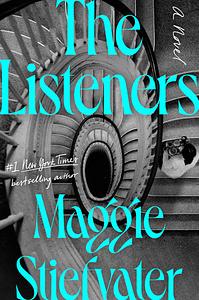Take a photo of a barcode or cover
Very beautifully written with a compelling premise. The beginning and middle really hooked me, but I do feel like the story started to lose momentum in the last 1/4ish.
There were also some elements that I would have liked to be explored a bit more that to me fell a bit flat - likeJune's relationship with Mr Francis, particularly June having to come to terms with how he saw her, or the woman in 411. I also would have liked some of the sweetwater effects to be described a bit more clearly instead of just being talked around or alluded to.
Still, an excellent book - I expect my copy will get loaned out to multiple people I think will like it as much as I did.
There were also some elements that I would have liked to be explored a bit more that to me fell a bit flat - like
Still, an excellent book - I expect my copy will get loaned out to multiple people I think will like it as much as I did.
hopeful
reflective
funny
hopeful
informative
inspiring
reflective
tense
fast-paced
Plot or Character Driven:
A mix
Strong character development:
Yes
Loveable characters:
Yes
Diverse cast of characters:
Yes
Flaws of characters a main focus:
No
emotional
reflective
medium-paced
Plot or Character Driven:
A mix
Strong character development:
Yes
Flaws of characters a main focus:
Yes
emotional
informative
tense
medium-paced
Plot or Character Driven:
Character
Strong character development:
Yes
Loveable characters:
Complicated
Diverse cast of characters:
Yes
Flaws of characters a main focus:
No
Maggie Stiefvater is very good at atmosphere, and she's very good at sentence-level writing. Both of those aspects were evident in her adult debut, and she was able to transport me effectively to 1942 West Virginia, where the Avallon Hotel and Spa has been commandeered by the U.S. government to house foreign diplomats from Axis countries during World War II; they're not prisoners of war, and yet they can't be trusted to wander the country freely with their loyalties to their home countries, so they're confined to this and other hotels (a true part of history about which Stiefvater did much research). I believed I was there, and I believed the characters were real people, and I even believed in the mystical "sweet water," the mineral water that has a mind of its own and plays a vital role in the continued success of the hotel.
And yet, this book suffers from what I see in a lot of historical fiction that comes out of an author's fascination with a particular place and time in history. Stiefvater puts so much energy into immersing the reader in this history that the story is ultimately secondary to the atmosphere. And no matter how well constructed the story is and how believable the characters are and how clever the little plot twists are, it lacked a driving force to propel me through the story. I wanted less about the designs of rooms and fountains and the impacts of rationing and the various cultural idiosyncrasies that screamed, "Look at how much research I did!" and a little more development of relationships between the characters, so that when they had to make difficult choices, when longing blossomed into love, when fear of loss led to taking big risks, I would have been a bit more emotionally invested. The relationship between June and Sandy, for example: We're told through a few bits and pieces that he was like a younger brother to her, almost like a son, but it's done through such scant detail thatJune's devastation at Sandy coming home from war unresponsive in a wheelchair, and her joy and relief on finding it was a sham lacked the emotional punch that could have come from seeing more of their closeness in younger days.
I'd recommend this narrowly to people who like atmospheric historical fiction that immerses them in a part of history they weren't previously familiar with. For those just looking for a story to get lost in, I think this is good but not great.
And yet, this book suffers from what I see in a lot of historical fiction that comes out of an author's fascination with a particular place and time in history. Stiefvater puts so much energy into immersing the reader in this history that the story is ultimately secondary to the atmosphere. And no matter how well constructed the story is and how believable the characters are and how clever the little plot twists are, it lacked a driving force to propel me through the story. I wanted less about the designs of rooms and fountains and the impacts of rationing and the various cultural idiosyncrasies that screamed, "Look at how much research I did!" and a little more development of relationships between the characters, so that when they had to make difficult choices, when longing blossomed into love, when fear of loss led to taking big risks, I would have been a bit more emotionally invested. The relationship between June and Sandy, for example: We're told through a few bits and pieces that he was like a younger brother to her, almost like a son, but it's done through such scant detail that
I'd recommend this narrowly to people who like atmospheric historical fiction that immerses them in a part of history they weren't previously familiar with. For those just looking for a story to get lost in, I think this is good but not great.
slow-paced
As a long time Stiefvater fan, it pains me to say that The Listeners didn't resonate with me.
The Listeners revolves around the Avallon hotel and it's manager, June Hudson. It's 1942, and the Avallon has been commandeered to host diplomats and their families. There is also some magical realism involved with the sweetwater that flows beneath the hotel. The premise of the story didn't jump out to me, but, being a Stiefvater fan, I was still excited to read it. I do think that my lack of connection to the novel may be due at least in part to the fact that I don't particularly care about name dropping and fancy hotels. Obviously there are much deeper themes in this novel, but, on the surface, that's what you're reading about.
I have followed Stiefvater in the past, and I know that she talks about how writing adult novels are different than YA: different elements, more metaphors, deeper meanings, etc. She knows HOW to write, and the writing itself in The Listeners is decent. The characters were where this story really fell apart for me. I didn't connect with any of them, even June. There were too many characters, and they were all what I call paper dolls.
I would have DNFed The Listeners, but I wanted to finish it as part of my Powell's summer bingo challenge and also because I wanted to make sure that the book didn't massively improve for me by its conclusion. Readers who have an interest in the war effort in the early 1940's or an interest in historical figures of the time may really like this novel.
The Listeners revolves around the Avallon hotel and it's manager, June Hudson. It's 1942, and the Avallon has been commandeered to host diplomats and their families. There is also some magical realism involved with the sweetwater that flows beneath the hotel. The premise of the story didn't jump out to me, but, being a Stiefvater fan, I was still excited to read it. I do think that my lack of connection to the novel may be due at least in part to the fact that I don't particularly care about name dropping and fancy hotels. Obviously there are much deeper themes in this novel, but, on the surface, that's what you're reading about.
I have followed Stiefvater in the past, and I know that she talks about how writing adult novels are different than YA: different elements, more metaphors, deeper meanings, etc. She knows HOW to write, and the writing itself in The Listeners is decent. The characters were where this story really fell apart for me. I didn't connect with any of them, even June. There were too many characters, and they were all what I call paper dolls.
I would have DNFed The Listeners, but I wanted to finish it as part of my Powell's summer bingo challenge and also because I wanted to make sure that the book didn't massively improve for me by its conclusion. Readers who have an interest in the war effort in the early 1940's or an interest in historical figures of the time may really like this novel.
challenging
emotional
mysterious
reflective
sad
medium-paced
Plot or Character Driven:
A mix
Strong character development:
Yes
Loveable characters:
Yes
Diverse cast of characters:
No
Flaws of characters a main focus:
Complicated
adventurous
dark
emotional
mysterious
tense
fast-paced
Plot or Character Driven:
Plot
Strong character development:
Complicated
Loveable characters:
Yes
Diverse cast of characters:
No
Flaws of characters a main focus:
No
mysterious
reflective
slow-paced
Plot or Character Driven:
A mix
Strong character development:
Yes
Loveable characters:
Complicated
Diverse cast of characters:
Yes
Flaws of characters a main focus:
Complicated







